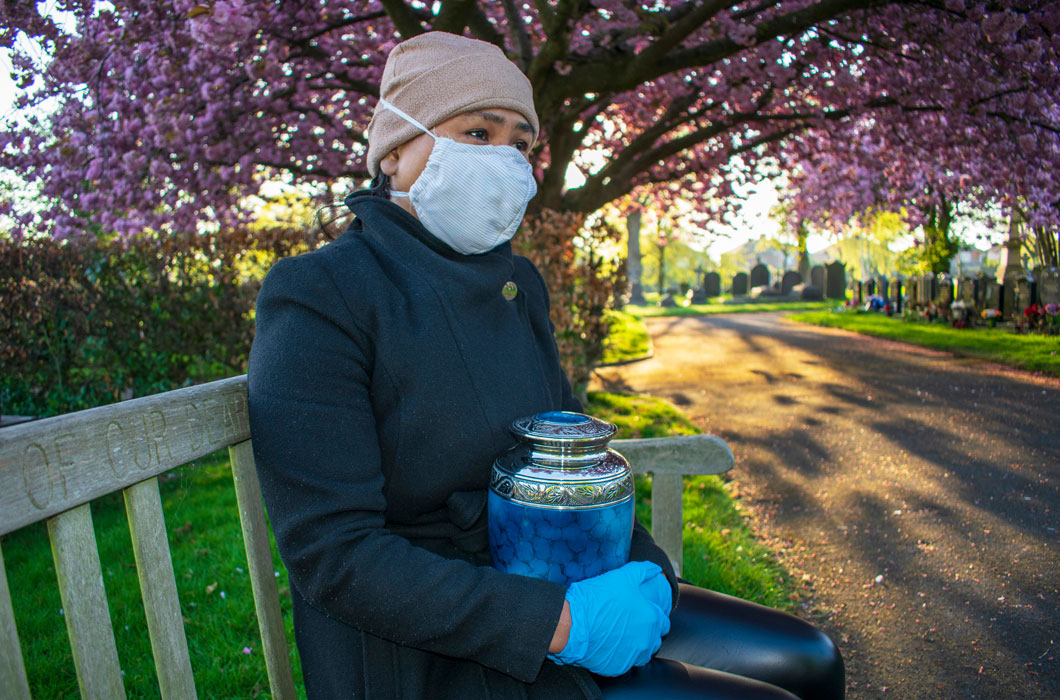Creating a Celebration of Life
Honoring the Life of a Loved OneWhen someone dies, we want the chance to say goodbye, honor their memory, and look for meaning in the death. Throughout history, we have turned to serve these purposes. And, without a doubt, holding a ceremony to memorialize someone we have lost holds an important place in the process of handling grief.
While the need to mourn hasn’t changed, the ceremonies we use to help us through the process has. For example, as the use of cremation has increased, holding a memorial service rather than a traditional funeral has become popular. The difference is that the body is present during a funeral, while at a memorial service, it is not. Memorial services also provide the flexibility our diverse and more mobile society requires since they are not tied to a specific time or place.
But for many people, traditional funeral rituals have become too impersonal. And so we have seen the rise of “The Celebration of Life.”
WHAT IS A CELEBRATION OF LIFE?
A Celebration of Life is a ceremony held either in concert with a traditional funeral or memorial service or instead of a traditional service as a stand-alone event.
What makes a Celebration of Life different is the level of personalization and tone. A Celebration of Life is not a somber affair. Instead, we find lots of laughter and storytelling. The focus is not on the person’s death but on the joy that the person brought to others.
HOW DO YOU PLAN A CELEBRATION OF LIFE?
Planning a Celebration of Life is much like planning any other gathering commemorating a life event. You’ll need to decide on the specifics (time, place, etc.), how you will get the word out and what elements you would like to incorporate. If your situation doesn’t offer the time or resources to undertake such an effort, you can take advantage of the services provided by a Celebrant.
What is a Celebrant? Celebrants are professionals who work with families to design a service that is customized to their cultural, religious, and spiritual needs. They are trained to help arrange both secular and non-secular celebrations. Celebrant services are not limited to Celebrations of Life. They often work with people to plan traditional funerals or memorial services as well. Many celebrants are qualified to take on the role of officiant as well as help to plan the service. Learn more about using celebrants.
HOW TO PLAN A CELEBRATION OF LIFE
- Choose the type of service:
Will this be a funeral or a memorial service? Will it be stand-alone or part of a more traditional funeral? What would you like the tone to be?
- Set a budget:
While worrying about the cost may seem inappropriate, it is important that you know how much you can reasonably afford. Having an idea of what your financial constraints are can help you narrow down your choices for the details of the celebration such as the type of food and the venue.
- Estimate how many people will attend:
It may be difficult to determine an exact headcount, but an estimate of the number of people you think will attend is important for selecting the right sized venue and refreshments, if you plan to offer them.
- Choose a location, date, and time:
When designing a Celebration of Life you are not limited in your choice of venue. You can certainly take advantage of the space available at a funeral home but you can also choose to have your event at your home, at a local park, or at some location that held meaning for the person you are honoring. Don’t forget to consider unconventional locations as well as the tried and true. For example, if the deceased was a film lover you consider renting a theater for your celebration.
- Decide if you would like to use a Celebrant:
For many people, the idea of planning a large event can be overwhelming. In these cases, a Celebrant can help take the pressure off by working through the details with you. If you would like to be totally hands-off, that’s ok. If you would like to handle just a certain segment of the Celebration, your Celebrant can work with you in that area as well.
- Select who you would like to speak:
You can ask specific people to share their thoughts or invite anyone who would like to offer an anecdote to speak. You should give them guidance on the type of story they would share. You can also ask the Celebrant to speak on your behalf.
- Determine activities you would like to include:
The beauty of a celebration of life is that you can customize your ceremony however you’d like. Think about the way your loved one preferred to spend his or her time. A sky lantern release, a group motorcycle ride, a book drive, or a group walk are all examples of the type of activities that are common. The important thing is that the activity is an appropriate tribute to your loved one.
- Decide on what type of refreshments you would like to have:
Your venue, budget, and other constraints can help you decide on the type of refreshments you serve. You are not expected to provide a full meal unless that is something you would really like to do. In any case, food and drink are not required.
- Choose ways to personalize the event:
You have unlimited choices when it comes to personalizing your event. Many people create a tribute movie or slide show and display photos around the venue. Your choice of music and readings can also be highly personal. If the deceased was a collector, for example, you might decide to display some of his or her items on a special table. Would a theme be appropriate? If your loved one was fond of a particular musical artist, film, or set of characters you might request that attendees dress in costume. Remember, there are no rules.
- Set your order of events:
Many people choose to include structured elements such as readings and music followed by some type of group activity and then a reception. There is no right or wrong way to do it, only what is best for you and your loved ones.
- Choose how you will decorate the venue:
If you are having your celebration at an outdoor location such as on the beach or at a park, it may not be necessary to have decorations at all. This is entirely up to you.
- Determine how you will get the word out:
If the Celebration of Life takes place as part of a traditional funeral or memorial service, include this in the obituary and social media details. You can also ask others to spread the word to others who would like to pay their respects. If you are having a celebration that is separate from traditional services, stand-alone, or will take place sometime in the future, you may want to take the added step of calling or writing a note to those who may not be active online. Invitations are not normally sent for funerals, but it is perfectly acceptable to personally invite people to a Celebration of Life if you would like to. Keep in mind that people who do not receive a formal invitation may still want to attend.
You do not have to hold your Celebration of Life in a funeral home. It doesn’t have to be religious or conform to any particular rules or guidelines. Your celebration can be as unique as the person you are honoring. It is entirely up to you to decide what is suitable for your ceremony. You are free to include only those components that your loved one would approve of or that you and your family are comfortable with.
Planning a ceremony can seem overwhelming. Just take it step-by-step. Don’t hesitate to ask for help. You will create an event that is the perfect final send-off to celebrate an extraordinary life in no time at all.
CREATING A MEANINGFUL CEREMONY
Is there such a thing as a “good” funeral? We believe that a good funeral is a meaningful one. A life is commemorated, friends express their condolences, and the grieving family is comforted. The ceremony can take many forms; there is no right or wrong way to do it. There can be music and prayers, tears and laughter. When a “good funeral” is over, there is a general feeling that it was a fitting send-off.
Funerals and Society
Every culture throughout history has marked death with a ritual or ceremony. Funerals play an important role in helping family and friends cope with loss, heal the pain, and understand death.
However, because our society has become fast-paced, youth-focused, and death-denying, the traditional funeral has lost meaning for some. Many experts are concerned that contemporary, simple funerals that do not incorporate meaningful ceremonies fail to provide the comfort loved ones can find in more traditional ceremonies. Successfully planning a meaningful service does not require a religious affiliation or a huge budget. It takes a thoughtful awareness of the practical requirements and emotional needs.
The Needs of the Mourning
“Rich in history and rife with symbolism, the funeral ceremony helps us acknowledge the reality of the death, gives testimony to the life of the deceased, encourages the expression of grief in a way consistent with the culture’s values, provides support to mourners, allows for the embracing of faith and beliefs about life and death, and offers continuity and hope for the living.”
Dr. Alan Wolfelt, noted author, educator, and practicing clinical thanatologist.
According to Dr. Wolfelt, a funeral helps the bereaved meet six basic needs of mourning. Bereaved people who meet these needs are most often able to reconcile their grief and go on to find continued meaning in life and living.
- Acknowledge the reality of the death.
Planning and attending meaningful funeral ceremonies helps us move past the intellectual understanding of death to acknowledge the reality that the person has died. - Move toward the pain of the loss.
The funeral helps us express and embrace the pain of our grief, enabling us to begin to heal. - Remember the person who died.
A meaningful funeral enables us to share memories of the person who died. This initiates a shift in our relationship with the deceased from one based on physical presence to one based on memories. - Develop a new self-identity.
The loss of a loved one often changes our role. We may no longer be a husband, daughter, or parent except in memory. The funeral serves as a “rite of passage” that begins the process of developing a new self-identity for the bereaved. - Search for meaning.
A funeral provides an opportunity to explore the meaning of life and death. This may help to reinforce our faith and provide comfort. It may also allow us to confront our own mortality. - Receive ongoing support from others.
Funerals serve as a central gathering place for mourners. Our attendance at a funeral demonstrates support for the bereaved and provides a venue for them to accept support in their grief.





